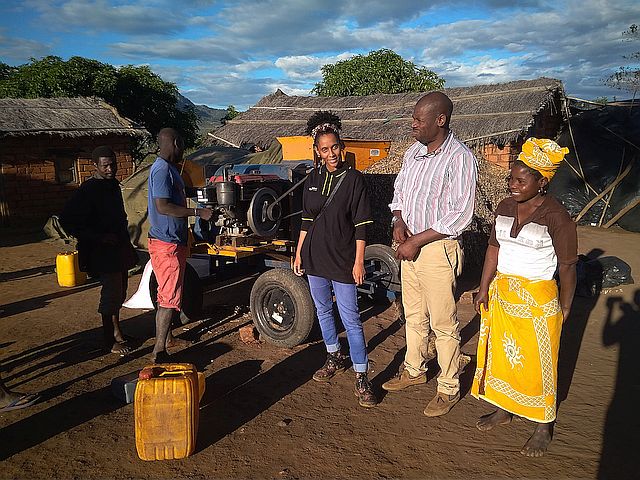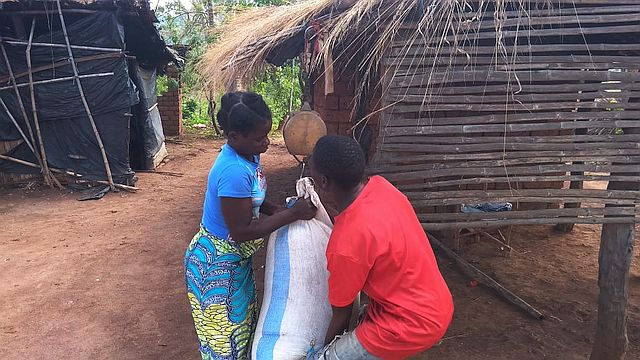Josina Nikwaniya began growing soy in 2018 as part of the Southern Africa Towards Soy Bean Import Substitution (SATSBIS) programme. She started off with a 150 square metre demo plot on her farm in Mozambique to assess her capacity to produce sustainably. This was her way of managing the risk of producing a crop she was still getting familiar with.

Josina Nikwaniya (far right) with a farm worker, her son, and Abigail Moreira, Gender and Youth Coordinator, and Gilberto Nhantumbo, Senior Programme Coordinator, both of Solidaridad, in front of Josina's threshing machine
Through the programme’s good agricultural practice training, she was able to harvest 30 bags of 50 kilogrammes each, which she sold to a local soy processor to support her family. With a renewed sense of confidence, Josina grew three hectares of soy in 2019. Her harvest was 2,000 kilogrammes this time, which she sold for 1,600 dollars.
Gender inclusivity training
Josina is one of the many women farmers thriving in a male-dominated sector. Solidaridad has ensured gender inclusivity training is included in the SATSBIS programme. The training initiated dialogue around challenging gender norms among farmers, encouraging women in farmer groups to pursue value-added enterprises as well as nutritional education. Josina found the gender-based training particularly helpful.
“I really enjoyed the nutritional education as I was pregnant at the time. It helped me to balance my diet and keep my baby healthy" – Josina Nikwaniya, soy farmer
Selling homemade cakes
“I really enjoyed the nutritional education as I was pregnant at the time," Josina says. "It helped me to balance my diet and keep my baby healthy. As a result, I carried the baby to full term with no complications.” This is critical as the World Food Programme reports that child mortality associated with undernutrition is very high in Mozambique, where 60 percent of the adult population suffered from stunting as children.
Through the nutritional education training, Josina has become more conscious of her whole family’s nutritional intake and has managed to turn her newfound love into a business, baking cakes which she sells to the community from her home. This has created a consistent, dependable supplementary income for her.

Josina and her son weighing a bag of soybeans
Part of a new soy belt for Southern Africa
The SATSBIS programme aims to transform the Southern Africa soy sector. Implemented by Solidaridad, it is creating a cohort of capable smallholder soy farmers, who have access to superior inputs, technical support, profitable markets and sustainable production practices.
The programme was set up to develop a Southern African soy belt from Gúruè in northern Mozambique to Zambia and Malawi. Its key elements are:
- seed multiplication
- demonstration of good soy agronomy
- delivering digitally enabled services (soil testing, mobile apps and rewards)
- creating viable uptake mechanisms for both seed and processing soybeans within the producer region
Josina's plans for 2020
Josina plans to expand her soy planting to five hectares and mechanise her operation in 2020. She is also creating a market among the farmers within her local association, selling 50-kilogramme bags of soy seed to fellow farmers who pay her back 120 kilogrammes of seed after their harvest.
>Read more about Solidaridad's work in the soy supply chain
